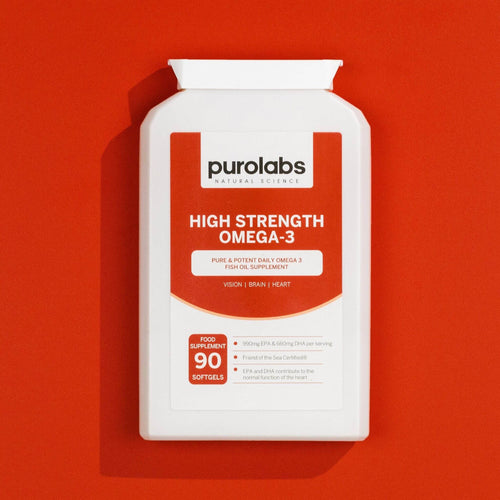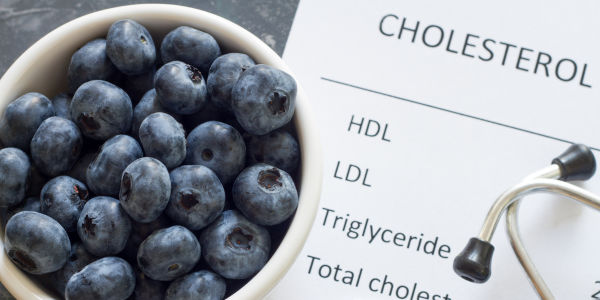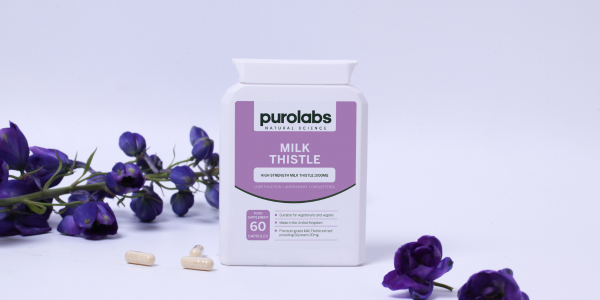Sadly, chronic health conditions, and in particular heart disease, are on the rise. Here in the UK, one in eight men and one in fourteen women die from cardiovascular disease, making it a leading cause of death for a quarter of the adult population1.
While the statistics are shocking, there are many adjustments we can make to our diet and daily lifestyle choices that can significantly reduce our risk of heart disease.
Cholesterol is a measurable biomarker to monitor when assessing cardiovascular health. Cholesterol levels are commonly checked to indicate whether a person is at risk of developing heart disease and stroke2.
There are other ways to measure one’s risk of heart disease, but measuring serum cholesterol is a great way to identify your risk for cardiovascular disease (CVD) and to put preventative measures in place.
Cholesterol is an essential fat that we produce endogenously (internally) and obtain through our dietary intake. It plays a vital role in building our steroid hormones and is essential for our body to produce the vitamin of all vitamins: vitamin D.
There are, however, two types of cholesterol to distinguish, as cholesterol can get a bad rap: HDL (high-density lipoprotein) and LDL (low-density lipoprotein). It’s important to establish the difference to fully assess your risk for cardiovascular disease.
We generally have higher levels of the ‘bad’ type (LDL) in our blood, which is also used to protect nerves, support healthy cell function, and create hormones. Excessively high levels of LDL, however, are associated with heart disease and poor metabolic health. HDL is what’s referred to as ‘good cholesterol’ and acts to transport LDL from our arteries back to the liver to be processed before being excreted from the body3.
While both types of cholesterol play a part in human health, as with all things, you can certainly get too much of a good thing when it comes to this essential fat.
So, what can you do to help your body produce more ‘good’ cholesterol and less ‘bad’ cholesterol? Read on for my top 3 recommendations to improve cholesterol levels to support a healthy heart and strong body:
Take a Good Quality Omega-3 Supplement
The single most important nutrient you can supplement with to reduce LDL cholesterol is a good quality omega-3. Omega-3 has a range of heart-healthy benefits4:
- Helps to reduce the risk of developing an irregular heartbeat
- Helps to reduce the buildup of arterial plaque
- Can reduce blood pressure
- Can help to lower LDL cholesterol
- May improve circulation
I must stress that focusing on quality is paramount when choosing this vital supplement. Poor manufacturing procedures can alter the supplement's benefits from being an antioxidant to pro-inflammatory—quite the opposite of its intended action.
At Purolabs, our omega-3 supplement has undergone stringent manufacturing processes to ensure that it is free of heavy metal contaminants and is sustainably sourced, non-GMO, and contains a favorable dose of heart-healthy EPA/DHA.

Omega-3
Make Lifestyle Improvements
The way we live our life directly impacts how much inflammation we carry. Stress, poor sleep, regular alcohol intake, and smoking have all been shown to add to the inflammatory load, which has a detrimental effect on cardiovascular health and a range of chronic health conditions.
Drinking alcohol raises triglycerides and cholesterol in the blood. If levels become chronically high, then fats aren’t excreted effectively from the liver, which may eventually lead to fatty liver disease. If the liver can’t function optimally to remove excess cholesterol from the blood, we store excess cholesterol, promoting cardiovascular disease5.
While it appears as though we cannot have any vices, it really comes down to balance and moderation. Harsh restriction can, in fact, lead to a heightened stress response.
Adopting daily stress-busting exercises is a simple but incredibly effective (and understated) way to improve heart health and reduce inflammation:
- Go for a daily walk, preferably in nature or with loved ones
- Adopt a short daily breathing practice
- Maintain a regular bedtime routine
- Journal your thoughts; it’s a great way to ‘dump’ your stress from the day to clear your head for a restful night’s sleep
- Prioritize movement in a way that feels good to you, as regular exercise has been shown to reduce LDL cholesterol6
Eat a Diet Abundant in Whole Foods
A diet rich in whole foods supports blood pressure through a high intake of potassium, magnesium, and calcium-containing plant foods. Lowering blood pressure helps to improve circulation and reduce the risk of stroke and blood clots7.
An anti-inflammatory heart-healthy diet can go a long way in reducing many risk factors for heart disease and helping to manage cholesterol levels. Consider adopting the following foods in your daily diet to support your heart and health long-term8:
- Fatty fish, as it contains heart-protective antioxidant omega-3s
- Nuts and seeds, which are high in ‘good’ monounsaturated and polyunsaturated fats9
- Legumes, which are blood sugar friendly and high in fiber, which is great for reducing LDL cholesterol
- Extra virgin olive oil, which has the highest percentage of heart-healthy monounsaturated fat
- Grains like brown rice, quinoa, and buckwheat to support blood sugar balance, which positively impacts HDL cholesterol10.
It is also important to consider reducing your intake of ultra-processed foods (UPFs), which wreak havoc on your cardiovascular system as they are high in ‘bad’ fats and sodium, increasing the risk of heart disease. Common UPFs include:
- Beverages with added sugar, particularly soft drinks
- Alcohol
- Margarines and seed oil spreads, which are high in trans fats
- Pre-packaged confectionery and bakery goods
- Processed meats
- Takeaway foods
- Refined grain products such as biscuits and packet noodles
One of the most highly studied diets proven to improve heart health is the Mediterranean diet. Studies show that it improves lipid balance by reducing LDL cholesterol and boosting HDL cholesterol levels. It has also been shown to improve blood pressure, insulin sensitivity, and key inflammatory markers.
A great diet is like good medicine (but without the side effects). Therefore, if you’re not sure where to start when it comes to heart health, a great place to begin is by buying a couple of Mediterranean diet cookbooks and experimenting in the kitchen11.

 Beauty
Beauty
 Bone Health
Bone Health
 Brain Health
Brain Health
 Energy
Energy
 Eye Health
Eye Health
 Gut Health
Gut Health
 Hair
Hair
 Hormonal Health
Hormonal Health
 Heart Health
Heart Health
 Immunity
Immunity
 Joints
Joints
 Menopause
Menopause
 Pregnancy
Pregnancy
 Kids
Kids
 Sleep
Sleep
 Stress & Mood
Stress & Mood




















